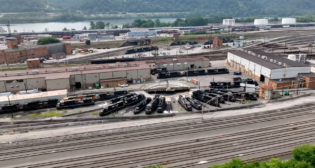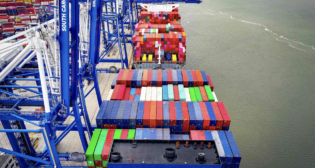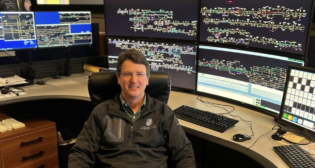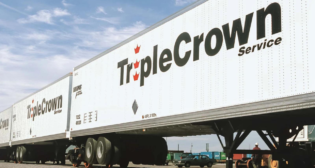
Railroads Help Fund Climate Change Denial: Report
Written by William C. Vantuono, Editor-in-ChiefIn a Dec. 13, 2019 report, “A Major but Little-Known Supporter of Climate Denial: Freight Railroads,” The Atlantic paints a blistering portrait of U.S. Class I railroads, accusing them and the Association of American Railroads as being “at the center of the climate-denial movement nearly since it began,” and whose “efforts to keep coal burning—and all those tons of carbon flowing into the sky—have been hidden in plain sight for decades.”
“For nearly 30 years, America’s four biggest rail companies—which move the majority of the country’s coal—have spent millions to deny climate science and block climate policy,” writes The Atlantic’s Robinson Meyer. “In the fight against climate change, the nation’s freight railroads have painted themselves as heroes. ‘Rail is the ‘the most environmentally friendly way’ to move cargo over land, says the Association of American Railroads, the industry’s trade group. The industry’s four biggest companies agree: ‘Railroads are essential to moving [climate] objectives forward,’ says CSX Transportation, the largest railroad east of the Mississippi. Yet for almost 30 years, the biggest players in the freight rail industry have waged a campaign to discredit climate science and oppose almost any federal climate policy, reveals new research analyzed by The Atlantic.”
The Atlantic’s story can be read in its entirety here. It cites research conducted by professors at Drexel University and Stanford University, and by four Brown University undergraduates as part of a class on “Engaged Climate Policy” whose instructor is J. Timmons Roberts, the Ittleson Professor of Environmental Studies at Brown.
The four students—Cole Triedman, 20; Andrew Javens, 20; Jessie Sugarman, 22; and David Wingate, 22—“collated political-spending disclosures from corporate and nonprofit disclosures,” The Atlantic reported. “They also used data from the Energy Information Administration to piece together the supply chains of roughly 25 of the country’s largest coal-fired power plants. ‘Tracking the mine to the power plant, we found that an elite cohort of coal companies is dealing with an elite cohort of rail companies,’ Triedman said. The rail industry has ‘been incredibly effective in hiding behind the veil of their own cultural capital for decades.’ The Association of American Railroads has participated in ‘eight of the most effective and toxically regressive, really harmful climate-denial front groups over the [past] three decades.’ But it has not mentioned climate change in any public statement in recent years, and its website does not use the phrase climate change.”
Railway Age asked the AAR to respond to The Atlantic story. The AAR responded immediately—supplying the identical statement it provided The Atlantic:
“Railroads stand as the cleanest way by far to move freight over land. Despite moving a third of freight volumes, railroads represent just 0.6% of total U.S. greenhouse gas (GHG) emissions and only 2.0% of transportation-related GHGs, according to the U.S. EPA. Moving goods by rail is three to four times more fuel efficient than by truck—resulting in up to a 75% reduction in GHGs. If just 10% of the freight moved by trucks today moved via rail instead, fuel savings would be more than 1.5 billion gallons per year, causing annual GHG emissions to fall by more than 17 million tons. The facts are clear—moving goods by rail is better for our environment.
“It has been nearly 20 years since AAR has been a member of the majority of the organizations listed. AAR and its member railroads take seriously their responsibilities as stewards of the environment, which is why railroads continue to implement numerous measures to reduce their carbon footprint. Efforts to strengthen the industry’s environmental performance in light of climate change have been noted as a success by the Carbon Disclosure Project and the Dow Jones Sustainability Index, among others. Specifically, railroads in recent years have deployed low emissions equipment and idle reduction technologies, increased fuel efficiency via fuel management systems, and many more initiatives.”



